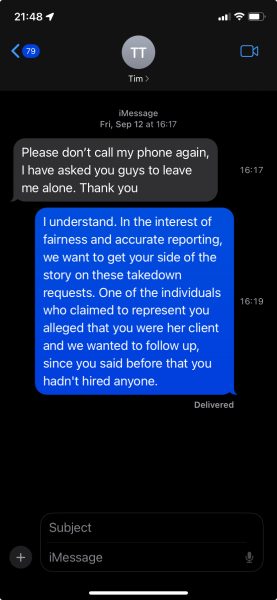
Eliot Faine
Graphic of a student journalist, using a rolled up newspaper to break the ribbon of silence.
Over the summer, The Citizen received multiple emails that claimed we had published libelous articles. The authors of the emails alleged they were reaching out on behalf of their client, Tim Thomas, Peralta Community College District’s former Executive Director of Public Safety.
The Citizen is Peralta’s only student-run news publication. We serve all four colleges as a watchdog. Just like professional newsrooms, we take accurate reporting very seriously.
The emails came as a “legal notice” to take down our articles, threatening legal action through a firm we never got the name of. The senders demanded that we issue a retraction and a public apology.
Between June and August, over a dozen emails were sent to several members of our newsroom.
If our reporting was, in fact, libelous, it would have to contain false information. We regard this accusation gravely.
“Takedown demands citing libel allegations should always be taken seriously: newsrooms in receipt of such demands should contact us at the Student Press Law Center or a media law attorney as soon as possible. However, some subjects of our journalism brandish baseless libel accusations, sometimes with the threat of legal counsel, as has happened here,” Jonathan Gaston-Falk, a staff attorney for the Student Press Law Center, wrote in an email to The Citizen.
“Student newsrooms are particularly vulnerable to such threats at a time when budgets are dwindling or gutted, heavy-handed administration censors students more readily, and distrust in the media generally is at a fever pitch,” Gaston-Falk wrote.
The Citizen reached out to Thomas on Aug. 28, via phone call, to ask if he had ordered the takedown requests. Thomas said he hadn’t hired anyone, didn’t know about the takedown requests, and that he was “out of state” at the time we reached out.
Then, on Sept. 2, one of the authors of the emails got back to us.
Javairia Sana responded to say that Tim Thomas was her client, and because she couldn’t get the articles removed, he had “canceled the order.”
The Citizen called Thomas again on Sept. 12, to understand why multiple people claimed that he is –- or was – their client.
He hung up on us, and then followed up with a text.

These emails demanding retractions and threatening legal action might just be intimidation tactics, bolstered by AI, but can chill a journalist to their bones in student and professional newsrooms alike.
According to a 2023 report from the Thomas Reuters Foundation, almost half of 493 alumni responded to a survey to report that they or their media organization had faced legal threats “as a result of their journalism.”
Accuracy and fairness are not just important to journalists, they’re fundamental to our ethical practice. Our professional training sets us apart from bloggers or influencers.
That training includes knowing our rights and responsibilities.
“Now more than ever, we need bold student journalists to keep investigating and publishing what matters to them. Remember: anything passing legal muster at the time of publication remains lawfully published. Consideration of any takedown demand of lawfully-published material is a fully editorial decision that must be made by the student journalists themselves,” Gaston-Falk wrote.
We were ultimately unable to confirm whether Thomas hired anyone, or the identity of the email senders, despite our attempts at communication.
In the end, it doesn’t matter who sent the emails or hired the service. Not only was our coverage of Thomas already past the deadline to sue, it was also well-researched, fair, and accurate.
In a tumultuous time of media censorship, we will not bend the knee. The Citizen stands up for the truth.